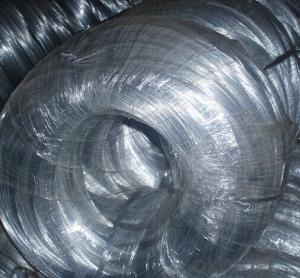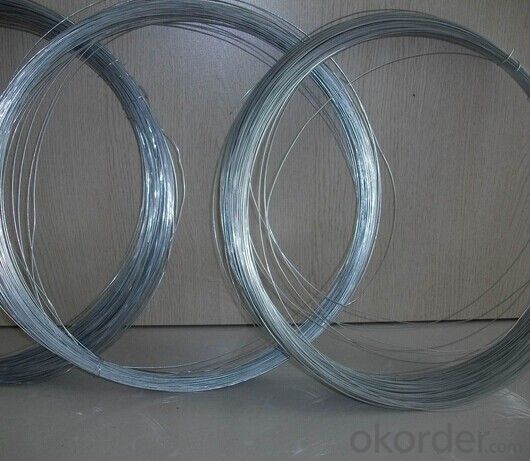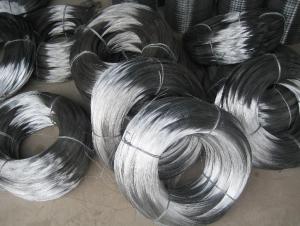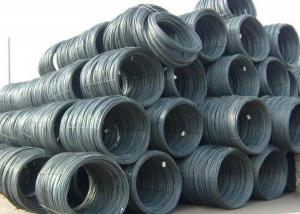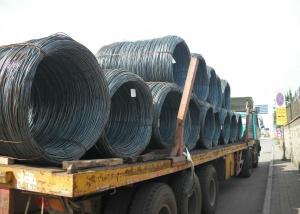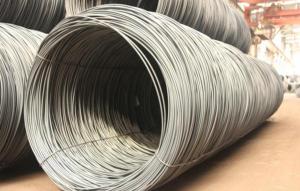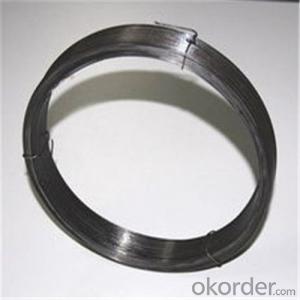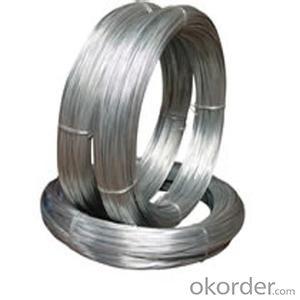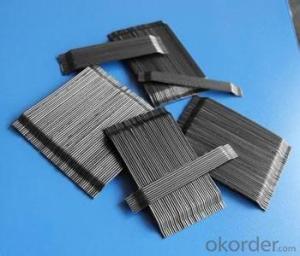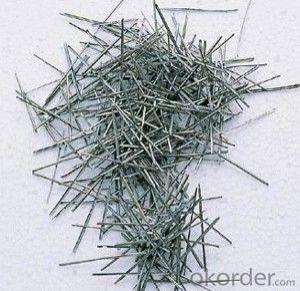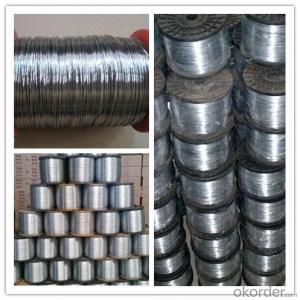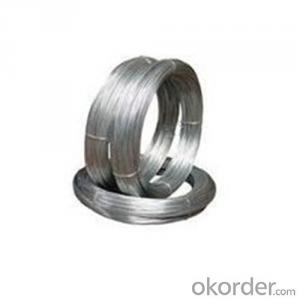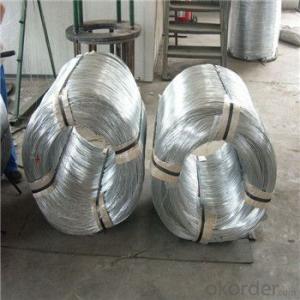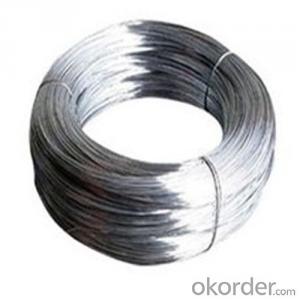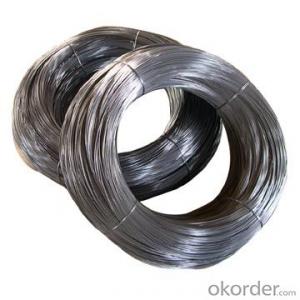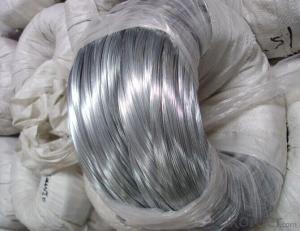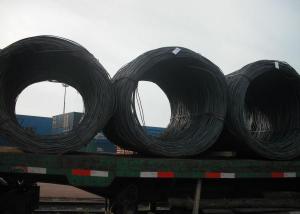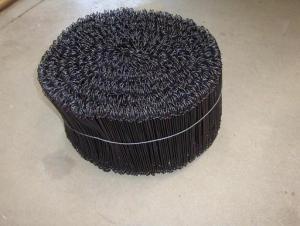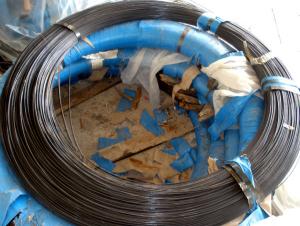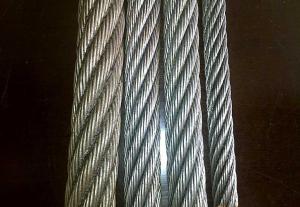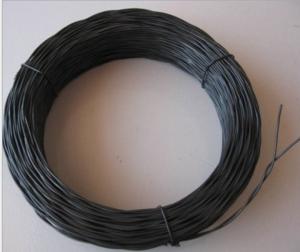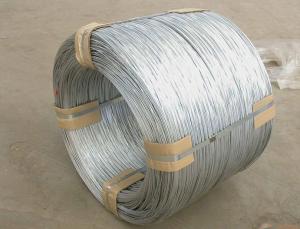Galvanized Iron Wire/Gi Binding Wire for Construction And High Quality
- Loading Port:
- Tianjin
- Payment Terms:
- TT OR LC
- Min Order Qty:
- 5 m.t.
- Supply Capability:
- 10000 m.t./month
OKorder Service Pledge
OKorder Financial Service
You Might Also Like
Specification
Galvanized Iron binding Wire/GI Binding wire for construction
Standard wire gauge for electro galvanized binding wire: from 0.5mm-5.0mm
Electric galvanized iron binding wire uses: Electric galvanized wire is used in weaving of wire mesh, fencing for expressway and construction.
Hot-DIP Galvanized Iron Wire Technical Information: Material: Super carbon steel Processing by drawing, hot-DIP zinc coating
Hot-DIP galvanized iron wire standard wire gauge: From 8# to 24#
Hot-DIP galvanized wire property: Thick zinc-coating layer of hot-dipped galvanized iron wire offers super corrosion resistance with firm coating layer. Custom size available.
Galvanized iron wire uses in weaving of wire mesh, fencing for expressway and construction.
Thick zinc-coating layer, uper in corrosion resistance
1. Materials: (a). Mild steel wire (b). Bullet wire (c). High-carbon steel wire.
2. Wire gauge size: BWG8# 14# 16# 18# 20# 21# 22#
3. Processing:
First draw (the material of wire rod to the right wire diameter0---Wire Annealing---Rust Removing--- Acid Washing--- Boiling--- Drying--- Zinc Feeding--- Wire Coiling.
4. Zinc coating: 8-15g/mm2 electro galvanized, 30-70g/mm2 hot DIP galvanized, 100-500g/mm2 heavy duty galvanized zinc coat.
5. Elongation: 10-15% for low carbon steel wire
6. Tensile strength: 350-550n/mm2 soft, 550-950n/mm2 hard drawn, 1000-2600n/mm2 high tensile strength.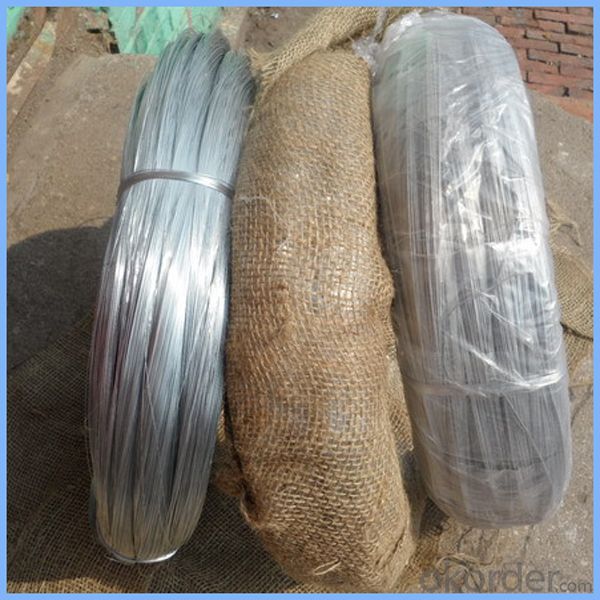
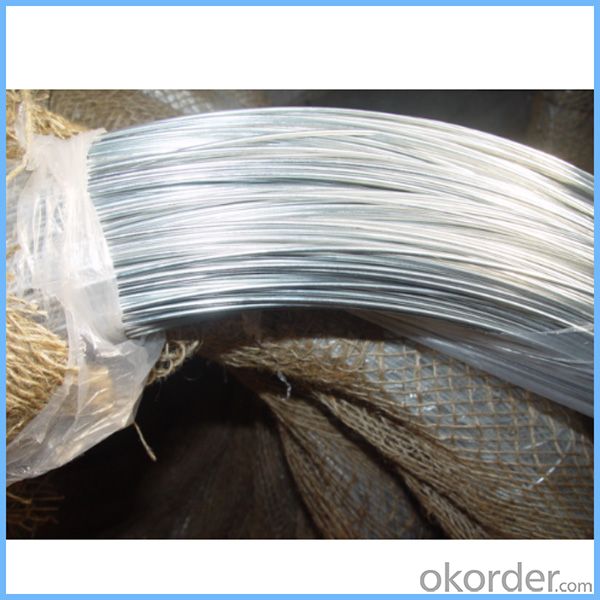
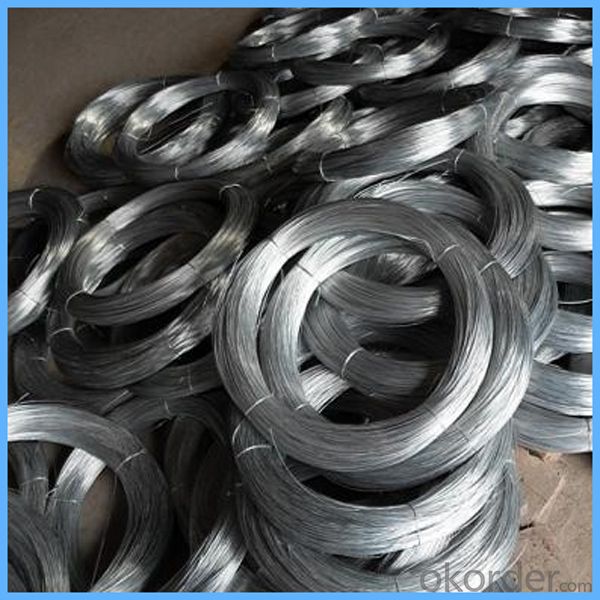
| size | dia |
| 4# | 6.0MM |
| 6# | 5.0MM |
| 7# | 4.5MM |
| 8# | 4.0MM |
| 9# | 3.8MM |
| 10# | 3.5MM |
| 11# | 3.0MM |
| 12# | 2.8MM |
| 13# | 2.5MM |
| 14# | 2.2MM |
| 15# | 2.0MM |
| 15# | 1.8MM |
| 16# | 1.6MM |
| 17# | 1.4MM |
| 18# | 1.2MM |
| 19# | 1.0MM |
| 20# | 0.9MM |
| 21# | 0.8MM |
| 22# | 0.7MM |
| 23# | 0.6MM |
| 24# | 0.55MM |
| 26# | 0.45MM |
| 28# | 0.35MM |
| 30# | 0.3MM |
Size(mm) | Tensile strength |
0.30---1.60 | 290-550 |
1.61---5.00 | 400-1200 |
Size(mm) | Coil size | Spool packing | Big coil packing | |
0.30_0.45 | 8inch | 1_100kg/spool | ID(mm) | OD(mm) |
0.46-0.60 | 8, 12inch | 1_100kg/spool | ||
0.61-1.60 | 12,14,16inch | 1_100kg/spool | 250-400 | 400-700 |
1.61-5.00 | 450 | 800 | ||
- Q: Hi,I have an issue with wiring in house. This is in Paris, France. I will share a foto so you can have a clearer picture what my question is.
- Got a meter? On the output side Wht/Grn = ground Brown = 'Hot' (230 V.) Blue = Neutral Test out what you've got in the French outlet box.
- Q: Some states allow the use of aluminum wire in houses in place of copper. If you wanted the resistance of your aluminum wire to be the same as that of copper, would the aluminum wire have to have a greater diameter than, smaller diameter than, of the same diameter as the copper wire? Calculate the thickness ratio of aluminum to that of copper.
- Are you using 12 volt batteries to do this..?
- Q: So Ive never done wiring for my car, But my friends are willing to talk me through it. But the next time I can talk to them is next week and they kept telling me to tap into wires. but What does that mean? like, what does it mean to quot;tapinto the wires?
- Tap means to splice into a wire. To join a new wire to the middle of an existing wire. Such as joining the wire for your new driving lights to the existing wire for the normal headlights. Before getting scared about cutting and soldering. Go to the parts store and get some IDCs. Just ask the counter guy for some suitcase connectors. You lay two wires next to each other and fold the IDC over them. When you squeeze it with pliers, it will join the two wires together.
- Q: When I am wiring my sub to my amp, what gauge of wire should I use? The sub is 750 rms and the amp is 700 rms. And how do I wire a 2 ohm sub DVC to a 2 ohm stable amp?
- I would use 12 gauge wire. You want to hook the positive wire from your amp to one coil's positive, and the negative to the other coil's negative and then make a jumper to connect the other two posts to each other. Hope this helped
- Q: What do you use to seal up the hole in the OUTSIDE wall where the cable TV and telephone wires and electrical wires all go thru? I want to replace my telephone wire coming in to the house, because I have DSL and it is really slow. I figured it couldn't hurt to replace the 45 year old wire coming in! :D I'm gonna use the best wire I can find (ANY SUGGESTIONS on what kinda wire to get? :D) to go from the telephone box outside to the DSL jack, but I need to no what to use to seal up the outside hole, when I rip out whatever is plugging it up now! :DThanks! ~Cindy! :D
- to add to what everyone said... sillicone caulking is what you need to use, it would be in the painting section (and plumbing section will have some too) of home depot if you plan on painting over this area you are going to have to substitute the silicone caulk with a paintable caulk, paint will not take to the silicone... CAT5 wire can be used, but as it is still on the voice circuit between the NID outside and your DSL jack you wont see much of a diffrence if you use CAT3 cable... CAT3 is voice grade cable, CAT5 is network grade cable... CAT3 is alittle easier to work with, as it is more flexable, and cheaper... but not by much... when you strip the outter jacket of the cable, leave at least 4-6 inches wraped inside the NID and the jack, so that if needed repairs can be made in the future.. blue/white to green solid blue to red and for line 2 (optional) orange/white to yellow solid orange to black if you are buying the wire per foot, then home depot will be fine, but if you are going to buy a box, check electrical and alarm supply stores, as there prices are much better then home depot...
- Q: I just bought an exhaust tip with leds which needs to be wired up to the brake lights on my mazda 626. Can somebody tell me which colour wire it is (positive) on the wiring to the brake light? There are a few wires and I dont know which one it is! Thanx
- How do you wire this up? You dont !! Beautifying your car is good to do but I have seen these LED tips and they look terrible. If you want your car to look like a cheap honda civic thats been dressed up, then go ahead and do this. if you still want to do this, use a multimeter across the two cables. run one lead to each wire. If you get a positive voltage when someone else presses the brake then the positive lead you have connected will be the side that is positive. If your voltage is negative, then the wire NOT connected to the positive lead is the positive
- Q: All household socket have two wires.Plese do not mention grounding, the ground would act as de-facto second wire
- This kind of depends on how you define the one wire. I can take a single wire and run it from the pos. pole on a battery over to the neg. pole, current will flow. If I shoot a model rocket with a single wire attached into a thunder cloud, current will flow. The problem comes in when you want to actually place a load into the circuit and make that current do some work. There HAS to be a return line, or ground, otherwise the circuit is open and no current can flow.
- Q: where also is fourth wire hooked in?
- If it is coming from the box at the street into your circuit breaker panel, I'll take a guess. Earth ground (Usually connected to a copper water pipe or a metal pole driven deep into the ground) Neutral (0V) +120 V (Most household circuits) +220 V (Dryers, stoves, possibly air conditioners and other devices needing lots of power. These have special plugs.) Unless you are ABSOLUTELY sure you know what you are doing (and it sounds from your question like you may not be) DO NOT mess around with mains wiring in your house and especially wiring coming into your house, since that isn't even on a surge protector to keep you even remotely safe. If you mess around with this stuff without knowing what you are doing, you could wind up DEAD or in the hospital VERY easily. I can't stress enough how dangerous electricity in large quantities is.
- Q: what wires do i use to bridge subs together?
- 14-18 gauge
- Q: I bought a chandelier from Ikea and I am having trouble wiring it. The colors do not match the colors in the ceiling. There is also one extra wire in the ceiling. This chandelier is to be controlled by a switch. Chandelier wire colors:WhiteBlackGreen/yellowCeiling wire colors:RedYellowBareBlackPlease help! Thank you!
- in case you look on the ceiling the pink cord is used for lights and the black cord is for direct potential or that's no longer linked on the different end. you will locate that in case you get rid of the conceal plate on the sunshine change the pink one is linked on the change. connect the warm lead black from the sunshine to the pink cord the white wires are floor and could all be linked alongside with the sunshine white cord, the fairway is a protection floor and could be linked to the container in some way and how it develop into is high quality. flow away all different wires on my own they do no longer something to do with the sunshine they only desire a container to end and start up in yet they artwork to run potential to different factors of your abode.
Send your message to us
Galvanized Iron Wire/Gi Binding Wire for Construction And High Quality
- Loading Port:
- Tianjin
- Payment Terms:
- TT OR LC
- Min Order Qty:
- 5 m.t.
- Supply Capability:
- 10000 m.t./month
OKorder Service Pledge
OKorder Financial Service
Similar products
Hot products
Hot Searches
